Papers by Andra-Ioana Horcea-Milcu
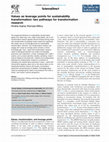
The burgeoning literature on sustainability transformation agrees that values play a key, albeit ... more The burgeoning literature on sustainability transformation agrees that values play a key, albeit unelucidated, role on the transformation research agenda. Recent literature linking values and transformation increasingly points toward the hypothesis that values may act as leverage points for sustainability transformation. However, how transformation research can engage with values as leverage points remains a critical knowledge gap. Here, I argue that transformation research needs to distinguish between two modes of knowledge production and mobilization: a linear, knowledge-first, mode-1 science, and a context-sensitive, linearity-contesting, mode-2 science. Based on this distinction, I identify two complementary pathways for transformation research to contribute to unleashing the transformative potential of values. I clarify that interventions targeting values rely on the stance taken on the relationship between science and society, and between production and governance of research. Knowledge about values as leverage points needs to be produced from both a mode-1 and mode-2 science perspective.
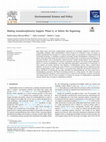
Both within science and society, transdisciplinary approaches are increasingly employed to addres... more Both within science and society, transdisciplinary approaches are increasingly employed to address today's sustainability challenges. Often transdisciplinary research processes are structured in three core phases: a) problem identification and formation of a common research object; b) co-production of solution-oriented and transferable knowledge; c) embedding co-produced knowledge through transdisciplinary reintegration. In all phases of this ideal-typical model, the involvement of non-academic actors is essential to meet the challenges of real-world problems, and of transformative research practices. Despite existing guidance for the core transdisciplinary process, its initiation often remains an uncharted area because of its strong context dependency. Based on a concrete transdisciplinary case study addressing sustainability transformation in Transylvania, we bring together our learned experience with initiating a transdisciplinary process using a research-driven approach. To this end, we introduce the notion of Phase 0, as an initiating phase prior to beginning an idealtypical transdisciplinary process. Within Phase 0, we propose three empirically and literature informed subphases: Sub-Phase 0.1) selecting the case study; Sub-Phase 0.2) understanding the case study context from a transdisciplinary perspective; Sub-Phase 0.3) fostering premises for coming together. We outline the general rationale behind these sub-phases, and we illustrate how we carried out each sub-phase in practice. By deriving cross-cutting lessons from the three sub-phases, we enhance the practice of transdisciplinary sustainability research with the aim to leverage its transformative potential.
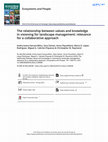
Respecting connections between the diversity of values and forms of knowledge is essential to sup... more Respecting connections between the diversity of values and forms of knowledge is essential to support a decision-making that fosters relationships between ecosystems and people. However, little theory has been developed for clarifying interactions between values and knowledge, and their relevance for environmental policy. We surfaced the overlooked relationship between values and knowledge by studying individual cognitive and emotional processes during a guided visioning exercise in the context of the multifunctional landscapes of Östergötland, Sweden. We investigated these cognitive processes using 30 semi-structured interviews and questionnaires organized around three types of relationships: vision ⇔ values, vision ⇔ knowledge, and especially values ⇔ knowledge. The analysis of the relationship between vision and values reveals that all types of values including core human values, relational, and intrinsic values are important in shaping the decision-making context in which landscape management visions arise. The relationship between vision and knowledge uncovers the mix of experiential and theoretical knowledge that informs the decisionmaking context. Interviews unfold three modalities in terms of how values and knowledge relate: i) linked and not necessarily connected (e.g. when individuals perceive a high conflict between their knowledge and their values leading to one construct silencing the other); ii) mutually reinforcing (e.g. when values and knowledge are seen as feeding into one another); and iii) intertwined (e.g. when individuals perceive that values and knowledge can co-exist). We discuss our findings in the context of their relevance for a collaborative decision-making process for balancing consensus and dissensus in multifunctional landscapes.
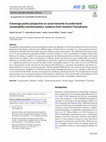
Sustainability Science
Sustainability transformations research increasingly recognizes the importance of local actors an... more Sustainability transformations research increasingly recognizes the importance of local actors and their networks to foster fundamental societal change. Local actors have different types of relations between each other (e.g., sharing material resources, giving advice) through which they jointly intervene in different system characteristics. We conducted social network analyses of 32 non-governmental organizations (NGOs) who drive initiatives to foster sustainability in Southern Transylvania, Romania. In so doing, we applied a leverage points perspective by differentiating between relations according to the system characteristic they address, such as the parameters, feedbacks, design and intent of the system. Additionally, we tested for differences of centrality metrics (i.e., weighted degree, betweenness, eigenvector) from NGOs that conduct different actions (i.e., amplification processes) to increase the impact of their sustainability initiatives. Our results reveal several NGOs th...
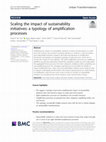
Urban Transformations, 2020
Amplifying the impact of sustainability initiatives to foster transformations in urban and rural ... more Amplifying the impact of sustainability initiatives to foster transformations in urban and rural contexts, has received increasing attention in resilience, social innovation, and sustainability transitions research. We review the literature on amplification frameworks and propose an integrative typology of eight processes, which aim to increase the impact of such initiatives. The eight amplification processes are: stabilizing, speeding up, growing, replicating, transferring, spreading, scaling up, and scaling deep. We aggregated these processes into three categories: amplifying within, amplifying out, and amplifying beyond. This integrative typology aims to stimulate the debate on impact amplification from urban and rural sustainability initiatives across research areas to support sustainability transformations. We propose going beyond an understanding of amplification, which focuses only on the increase of numbers of sustainability initiatives, by considering how these initiatives create transformative change.
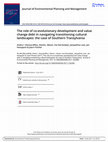
Journal of Environmental Planning and Management, 2017
Cultural landscapes and their social-ecological values are threatened by changing lifestyles, pol... more Cultural landscapes and their social-ecological values are threatened by changing lifestyles, policies and land-use practices, making their appropriate management a key sustainability challenge. Drawing on five years of interdisciplinary research in Transylvania, we conceptualise the notion of a 'landscape interface'-the intersection between the ecological and social subsystems, which through time, shapes and is shaped by the local value system. The landscape interface is a source of system continuity and stability. In Transylvania, many locals still act according to the value system associated with a disappearing landscape interface, a phenomenon we term a 'value change debt.' We argue that the erosion of the old value system, together with the weakening of the landscape interface, threatens sustainability-whereas reconnecting social-ecological feedback and thus strengthening the landscape interface could foster sustainability. The new conceptual perspective proposed here could foster greater understanding of cultural landscapes, including the social dimension of human-environment interactions.
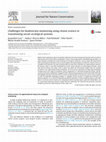
Journal for Nature Conservation, 2015
Biodiversity monitoring requires sound data collection over large temporal and spatial scales in ... more Biodiversity monitoring requires sound data collection over large temporal and spatial scales in order to inform policy and conservation management. Citizen science programmes, if designed appropriately, can make valuable contributions to data collection and analyses. Moreover, citizen science has potential for both environmental education and civic participation. Recommendations on effective citizen science are available in the literature, but most existing work has come from relatively rich, industrialized countries. By contrast, there is very little knowledge on citizen science projects in transitioning economic, social and cultural settings. This paper seeks to adjust this deficit by contributing insights from our attempt to initiate a new monitoring scheme in Romania. We draw on our experience of conducting workshops, training events and camps to strengthen citizen engagement in a butterfly monitoring scheme, and discussions with many stakeholders engaged in other monitoring programmes inside and outside of Europe. We highlight four general themes that are worth considering when initiating new citizen science projects in socioeconomically challenging settings: (i) engaging citizens requires a combination of formal and informal support; (ii) a culture of volunteering requires education as well as building capacity and confidence; (iii) citizen science needs active integration of both national experts and local stakeholders; and (iv) successful monitoring schemes require effective leadership. We conclude that particular attention should be paid to the cultural legacies of the target area.
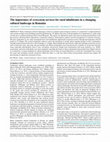
Ecology and Society, 2014
Many traditional cultural landscapes evolved as coupled social-ecological systems. It is importan... more Many traditional cultural landscapes evolved as coupled social-ecological systems. It is important to understand how such systems navigate novel challenges posed by globalization. To address this issue, we bring together two components of a pilot study carried out in a cultural landscape from Central Romania. The region was affected by major social and economic perturbations in the past century, affecting ethnic composition, community cohesion, land property regimes, and the management of common resources. The first component of our study investigated how rural inhabitants appreciated ecosystem services through questionnaires with 98 people in 30 villages. The second component aimed to assess the perception of people about ongoing changes in their communities through semistructured interviews with 50 people in 5 villages. Rural inhabitants particularly valued provisioning ecosystem services such as firewood, water, and crops, but also healthy soils. Rural communities were characterized by a number of social and economic issues, especially individualism, lack of trust, corruption, and poverty. People from communities with many initiatives, e.g., NGOs, associations, and active individuals, were more optimistic regarding the future of their communities than people from villages with few or no initiatives. A major challenge for cultural landscapes such as those in Central Romania is to find new, meaningful ways to keep the social and ecological systems connected. Otherwise there is a risk that (short-term) socioeconomic interests may impair the provisioning of important ecosystem services.
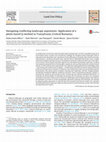
Land Use Policy, 2014
In combination, the economic realities brought about by globalization, and the sustainability goa... more In combination, the economic realities brought about by globalization, and the sustainability goals set by the European Union, translate into contradictory challenges for European cultural landscapes. With its high natural and cultural diversity, Transylvania (Central Romania) is facing the choice between development based on a "production for profit" logic, with the risks of a liberalized land market, versus a largely untested development pathway based on sustainability, landscape multifunctionality and conservation. In the context of these largely externally imposed and contradictory development pathways, clarifying the viewpoints and preferences of local people is important, and may help explain the outcomes of past policies, as well as inform future interventions. We undertook a photograph-based Q methodology study-interviewing 129 residents from 30 villages-to understand and explore the diverse range of landscape preferences held by locals in Southern Transylvania. We clarified these preferences by identifying groups of participants who shared similar viewpoints regarding local landscapes and their changing purpose. Our findings revealed five different "preference narratives" about Transylvanian landscapes, namely (1) landscapes for prosperity and economic growth; (2) landscapes for traditions and balanced lifestyles; (3) landscapes for human benefit; (4) landscapes for farming; and (5) landscapes for nature. Our systematic assessment of narratives showed areas of consensus and disagreement among participants. We relate the five preference narratives to current management approaches targeting rural landscapes. We conclude by suggesting policy approaches to tackle the diversity of opinions and interests found in this culturally and ecologically diverse landscape. Important policy priorities include fostering economic diversification and improving social capital.
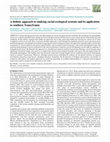
Ecology and Society, 2014
Global change presents risks and opportunities for social-ecological systems worldwide. Key chall... more Global change presents risks and opportunities for social-ecological systems worldwide. Key challenges for sustainability science are to identify plausible future changes in social-ecological systems and find ways to reach socially and environmentally desirable conditions. In this context, regional-scale studies are important, but to date, many such studies have focused on a narrow set of issues or applied a narrow set of tools. Here, we present a holistic approach to work through the complexity posed by cross-scale interactions, spatial heterogeneity, and multiple uncertainties facing regional social-ecological systems. Our approach is spatially explicit and involves assessments of social conditions and natural capital bundles, social-ecological system dynamics, and current development trends. The resulting understanding is used in combination with scenario planning to map how current development trends might be amplified or dampened in the future. We illustrate this approach via a detailed case study in southern Transylvania, Romania, one of Europe's most significant biocultural refugia. Our goal was to understand current social-ecological dynamics and assess risks and opportunities for sustainable development. Our findings show that historical events have strongly shaped current conditions and current development trends in southern Transylvania. Moreover, although external drivers (including EU policies) set the general direction of regional development trajectories, local factors, including education, leadership, and the presence of bridging organizations, can enhance or counteract their effects. Our holistic approach was useful for generating an in-depth understanding of a regional social-ecological system and could be transferred to other parts of the world.
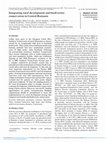
Environmental Conservation, 2013
SUMMARYUnlike most parts of the European Union (EU), Southern Transylvania (Central Romania) is c... more SUMMARYUnlike most parts of the European Union (EU), Southern Transylvania (Central Romania) is characterized by an exceptionally high level of farmland biodiversity. This results from traditional small-scale farming methods that have maintained extensive areas of high nature value farmland. Following the post-socialist transition, Southern Transylvania faces serious challenges such as under-employment and rural population decline, which put traditional farming at risk. With Romania's accession to the EU in 2007, Southern Transylvania became part of a complex multi-level governance system that in principle provides mechanisms to balance biodiversity conservation and rural development. To this end, the most important instruments are the ‘Natura 2000’ network of protected areas and EU rural development policy. Structured questionnaires and semi-structured interviews with town hall representatives from 30 villages in Southern Transylvania and local EU experts revealed that EU polic...
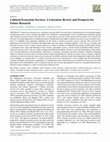
Ecology and Society, 2013
Cultural ecosystem services constitute a growing field of research that is characterized by an in... more Cultural ecosystem services constitute a growing field of research that is characterized by an increasing number of publications from various academic disciplines. We conducted a semiquantitative review of publications explicitly dealing with cultural ecosystem services. Our aims were: (1) to provide an overview of the current state of research, (2) to classify the diversity of research approaches by identifying clusters of publications that address cultural ecosystem services in similar ways, and (3) to highlight some important challenges for the future of cultural ecosystem services research. We reviewed 107 publications and extracted 20 attributes describing their type and content, including methods, scales, drivers of change, and trade-offs between services. Using a cluster analysis on a subset of attributes we identified five groups of publications: Group 1, conceptual focus, deals with theoretical issues; Group 2, descriptive reviews, consists mostly of desktop studies; Group 3, localized outcomes, deals with case studies coming from different disciplines; Group 4, social and participatory, deals mainly with assessing preferences and perceptions; and Group 5, economic assessments, provides economic valuations. Emerging themes in cultural ecosystem services research relate to improving methods for cultural ecosystem services valuation, studying cultural ecosystem services in the context of ecosystem service bundles, and more clearly articulating policy implications. Based on our findings, we conclude that: (1) cultural ecosystem services are well placed as a tool to bridge gaps between different academic disciplines and research communities, (2) capitalizing on the societal relevance of cultural ecosystem services could help address real-world problems, and (3) cultural ecosystem services have the potential to foster new conceptual links between alternative logics relating to a variety of social and ecological issues.

Ambio, 2019
Transformational research frameworks provide understanding and guidance for fostering change towa... more Transformational research frameworks provide understanding and guidance for fostering change towards sustainability. They comprise stages of system understanding, visioning and co-designing intervention strategies to foster change. Guidance and empirical examples for how to facilitate the process of co-designing intervention strategies in real-world contexts remain scarce, especially with regard to integrating local initiatives. We suggest three principles to facilitate the process of co-designing intervention strategies that integrate local initiatives: (1) Explore existing and envisioned initiatives fostering change towards the desired future; (2) Frame the intervention strategy to bridge the gap between the present state and desired future state(s), building on, strengthening and complementing existing initiatives; (3) Identify drivers, barriers and potential leverage points for how to accelerate progress towards sustainability. We illustrate our approach via a case study on sust...
Journal of Sustainable Development, 2021
Transdisciplinary research often utilizes collaborative ways of knowledge production to enable de... more Transdisciplinary research often utilizes collaborative ways of knowledge production to enable deliberate transformations towards sustainability. Multiple concepts with varying definitions are applied, leading to confusion in the aims and uses of these concepts. In this article, we review five concepts relevant to the current debate on
... They are the ones which are determining the global climate change policies even in Europe. ..... more ... They are the ones which are determining the global climate change policies even in Europe. ... Mathematical models can offer another theoretical approach of environmental policies, aiming to formulate a new (post 2012) long-term climate policy following the logic of ...

Sustainability Science, 2021
Sustainability transformations call forth new forms and systems of knowledge across society. Howe... more Sustainability transformations call forth new forms and systems of knowledge across society. However, few tools and processes exist for promoting dialogue among different interests and normative stances in knowledge co-creation. In this article, we build on the notion of thought collectives to argue that understanding and moderating normative tensions are necessary if sustainability science is to provide successful solutions. Drawing on an analysis of the normative tensions between rival high-tech and lowtech thought collectives in the mobility and food production sectors, we discuss three strategic approaches: applying common evaluative frameworks, building contextual convergence and embracing complexity. We argue that these strategies indicate a need to distinguish different kinds of reflexivity in managing tensions among thought collectives. As a practical conclusion, we establish sets of reflexive questions to help sustainability scientists deploy the knowledge management strategies discussed.








Uploads
Papers by Andra-Ioana Horcea-Milcu